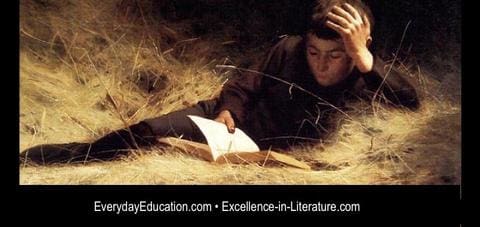Is it Better to Read Print or eBooks?
Is Print or eBook Better for Learning?
I am occasionally asked whether Kindle or other e-reader versions of the classics will work as well as the print versions. I know that digital books can be cheap and convenient, but I usually recommend print books for literature study.

There is a body of research that seems to indicate that print is superior, particularly for learning. This is not the only factor to consider, but it is a place to start. Here are a few articles to consider as you decide between print or ebook format.
The Reading Brain in the Digital Age: The Science of Paper versus Screens
Science Has Great News for People Who Read Actual Books
Why Young Readers Need Real Books by Maura Roan McKeegan
The Medium is the Medium by David Brooks
Readers absorb less on Kindles than on paper, study finds
Serious reading takes a hit from online scanning and skimming, researchers say
Michael Hyatt on "Why I’ve Put eBooks on the Shelf"
Children's and Young People's Reading in 2013
It’s "digital heroin": How screens turn kids into psychotic junkies
You won't remember this article, or anything else you read online, unless you print it out
The choice between print or Kindle is yours, of course, and students using an electronic version will still profit from using Excellence in Literature. Beyond the question of print or Kindle edition, there are other things to consider when choosing book formats.
Consider quality in any format
Quality of text and supporting material: Although many of the oldest classics are available free on Kindle, they often come without a helpful introduction or reader's notes and have not been carefully checked for scanning errors.
Quality of translation: In Excellence in Literature, we read a significant number of works in translation, including Homer's Odyssey, Dante's Divine Comedy, Cervantes' Don Quixote, and others. The quality of the translation significantly affects the understandability and enjoyability of the work. I have selected translations I feel are particularly clear or beautiful, and most are available in both print and digital formats.
What about audiobooks?
I have long recommended using an audiobook version for works that were originally composed to be told orally. Epic poems such as Beowulf, the Odyssey, and the Aeneid were written to be heard, and can often be best appreciated by ear. Audiobooks can also be useful for auditory learners and students who have learning difficulties. Listening to a book can help students see the big picture in a lengthy or complex work, and can often lead to a deeper understanding of underlying themes.
One caution — avid readers who immerse deeply in a book may find the audio format distracting or frustrating, so remember to be sensitive to learning preferences. Many students find it easier to absorb audiobooks when their hands are busy, so reading time can be a good opportunity to practice drawing, do handwork, construct with Legos, or other hands-on activities.
Choosing an audiobook
Most classics are available in audio format, and you will often have a choice between readers. A great reader can bring even the most challenging text to life, and a mediocre reader can sometimes spoil it.
Our family has a longstanding account with Audible.com, and when choosing an audiobook, we always listen to samples of each available reader in order to choose one whose voice and pacing fit the poem, play, or novel. Just as drama is most powerful when seen in performance, poetry is often most powerful when heard. Feel free to choose the format that best fits the poem, play, or story in each module.
Remember the goal
One of my primary goals with Excellence in Literature is to have students finish the year loving literature (or at least some of the books they've read). Consider your student's learning style and reading ability, the studies referenced here, and each classic work itself, and choose the format or edition that you believe will work best.
Amazon, Kindle, and Fire are trademarks of Amazon.com, Inc. or its affiliates. Any links to Amazon are likely to be affiliate links.